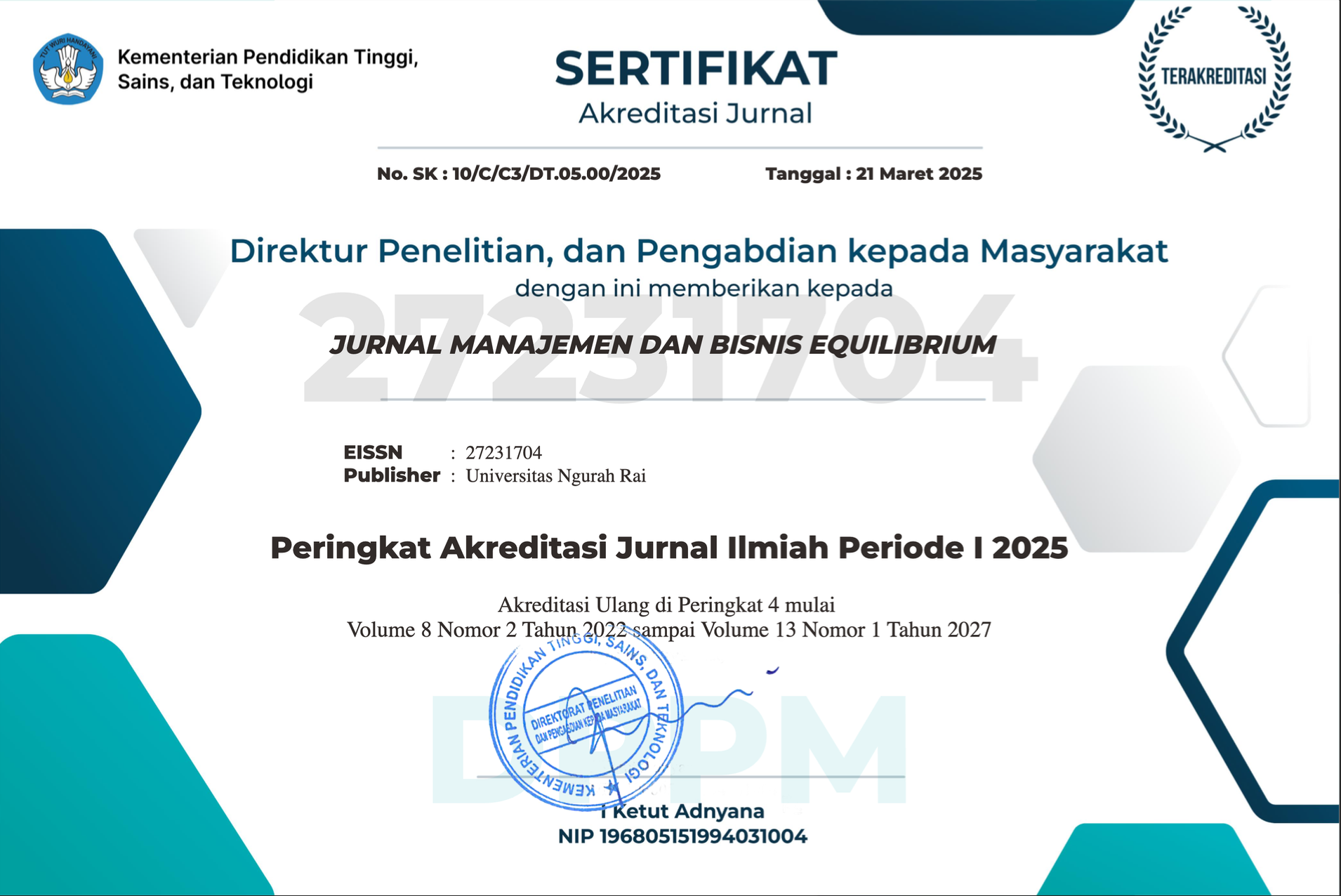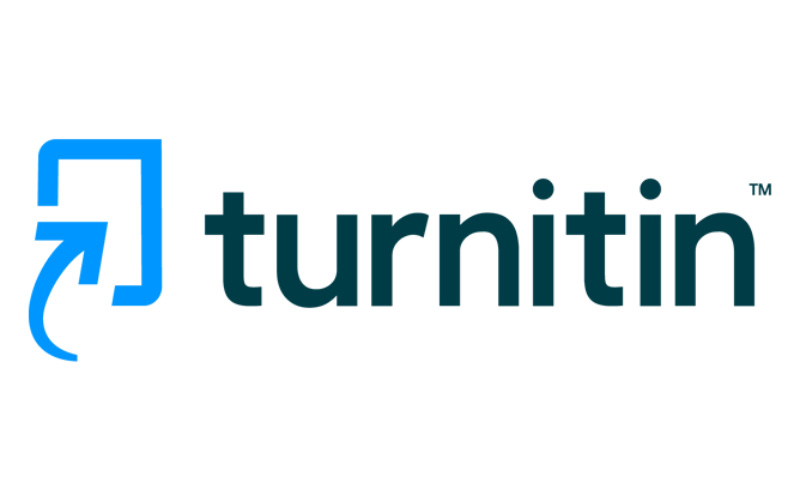LEADERSHIP AS A MODERATOR: THE INFLUENCE OF SELF-EFFICACY AND BEHAVIORAL INTEGRITY ON INDIVIDUAL CREATIVITY
Abstract
This study aims to analyze the influence self-efficacy, behavioral integrity, and leadership towards individual creativity on Small and Medium Enterprises (SMEs) in Bali. A quantitative approach was used through a survey of 474 respondents consisting of managers and employees, with analysis using Partial Least Square – Structural Equation Modeling (PLS-SEM). The results of the study show that self-efficacy, behavioral integrity, and leadership have a positive and significant influence on individual creativity. These findings confirm that employee self-confidence, consistent behavioral integrity, and good leadership practices can encourage increased creativity. However, the analysis also indicates that leadership does not act as a moderating variable in the relationship between self-efficacy and behavioral integrity with individual creativity, but rather has a direct influence on creativity. Theoretically, this research strengthens the perspective socio cognitive theory which explains creativity as the result of the interaction between personal and environmental factors. Practically, the implications of this research encourage SME leaders to strengthen leadership capacity, foster employee self-confidence, and uphold behavioral integrity as strategies to increase competitiveness through individual creativity.
References
Al-Ajlouni, Mohammed Iqbal. 2021. “Can High-Performance Work Systems (HPWS) Promote Organisational Innovation? Employee Perspective-Taking, Engagement and Creativity in a Moderated Mediation Model.” Employee Relations 43(2):373–97. doi: 10.1108/ER-09-2019-0369.
Al-Husseini, Sawan J., and Talib A. Dosa. 2016. “The Effects of Transformational Leadership on Process Innovation Through Knowledge Sharing.” World Academy of Science, Engineering and Technology International Journal of Economics and Management Engineering 10(8):2731–38. doi: 10.5281/zenodo.1126063.
Al-Mansoori, Reem S., and Muammer Koç. 2019. “Transformational Leadership, Systems, and Intrinsic Motivation Impacts on Innovation in Higher Education Institutes: Faculty Perspectives in Engineering Colleges.” Sustainability (Switzerland) 11(15). doi: 10.3390/su11154072.
Amabile, Teresa M., Regina Conti, Heather Coon, Jeffrey Lazenby, and Michael Herron. 1996. “Assessing the Work Environment for Creativity.” Academy of Management Journal 39(5):1154–84. doi: 10.5465/256995.
Amabile, Teresa M., and Julianna Pillemer. 2012. “Perspectives on the Social Psychology of Creativity.” Journal of Creative Behavior 46(1):3–15. doi: 10.1002/jocb.001.
Amabile, Teresa M., and Michael G. Pratt. 2016. “The Dynamic Componential Model of Creativity and Innovation in Organizations: Making Progress, Making Meaning.” Research in Organizational Behavior 36:157–83. doi: 10.1016/j.riob.2016.10.001.
Amabile, Teresa M., Elizabeth A. Schatzel, Giovanni B. Moneta, and Steven J. Kramer. 2006. “Corrigendum to ‘Leader Behaviors and the Work Environment for Creativity: Perceived Leader Support.’” The Leadership Quarterly 17:679–80. doi: 10.1016/j.leaqua.2006.10.010.
Andries, Petra, and Koenraad Debackere. 2013. “Business Model Innovation: Propositions on the Appropriateness of Different Learning Approaches.” Creativity and Innovation Management 22(4):337–58. doi: 10.1111/caim.12033.
Aristana, I. Nengah, I. Wayan Edi Arsawan, and Ni Wayan Rustiarini. 2022. “Employee Loyalty during Slowdown of Covid-19: Do Satisfaction and Trust Matter?” International Journal of Tourism Cities 8(1):223–43. doi: 10.1108/IJTC-03-2021-0036.
Aristana, I. Nengah, Ni Made Dwi Puspitawati, and Tjokorda Istri Tuty Ismayanthi. 2023. “Leadership and Employee Creativity: The Mediation Role of Intrinsic Motivation.” Media Ekonomi Dan Manajemen 38(1):161–85. doi: 10.56444/mem.v38i1.3270.
Aristana, I. Nengah, I. Wayan Sucipta Wibawa, and I. Made Bayu Wisnawa. 2024. “Psychological Empowerment Exploration on Innovative Work Behavior : The Role of Transformational Leadership as Mediator.” Jurnal Manajemen Bisnis 15(1):77–98. doi: 10.18196/mb.v15i1.20274.
Aristana, I. Nengah, I. Made Bayu Wisnawa, Anak Agung Dwi Widyani, Putu Pradiva Putra Salain, Tiksnayana Vipraprastha, and I. Made Aditya Wardana. 2025. “Transformational Leadership and Employee Creativity: Role Psychological Empowerment as Mediator.” Quality - Access to Success 26(205):222–34. doi: 10.47750/QAS/26.205.23.
Arsawan, I Wayan Edi, Ni Kadek ssy De Hariyanti, I. Made Ari Dwi Suta Atmaja, Dwi Suhartanto, and Viktor Koval. 2022. “Developing Organizational Agility in SMEs: An Investigation of Innovation’s Roles and Strategic Flexibility.” Journal of Open Innovation: Technology, Market, and Complexity 8(3):149. doi: 10.3390/joitmc8030149.
Arsawan, I. Wayan Edi, Viktor Koval, Ismi Rajiani, Ni Wayan Rustiarini, Wayan Gede Supartha, and Ni Putu Santi Suryantini. 2022. “Leveraging Knowledge Sharing and Innovation Culture into SMEs Sustainable Competitive Advantage.” International Journal of Productivity and Performance Management 71(2):405–28. doi: 10.1108/IJPPM-04-2020-0192.
Arsawan, I. Wayan Edi, Viktor Koval, Dwi Suhartanto, Ni Kadek Dessy Hariyanti, Natalіia Polishchuk, and Viktoriia Bondar. 2023. “Circular Economy Practices in SMEs: Aligning Model of Green Economic Incentives and Environmental Commitment.” International Journal of Productivity and Performance Management (85). doi: 10.1108/IJPPM-03-2022-0144.
Asad, Naveen, Hammad Bin Azam Hashmi, Mishal Nasir, Adeel Khalid, and Aftab Ahmad. 2021. “Transformational Leadership Relationship with Employee Creativity: The Moderating Effect of Knowledge Sharing and Mediating Effect of Creative Self-Efficacy.” International Journal of Innovation, Creativity and Change 15(8):1005–29. doi: 10.53333/ijicc2013/15913.
Badan Pusat Satatistik Provinsi Bali. 2021. Bali Dalam Angka. BPS Provinsi Bali.
Bandura, Albert. 1986. Social Foundations of Thought and Action: A Social Cognitive Theory. Englewood Cliffs N.J.: Prentice-Hall.
Bappenas. 2023. “Musrenbangnas RKP 2024 Dan Peluncuran Proyeksi Penduduk Indonesia 2020-2050.” Bappenas. Retrieved (www. bappenas.go.id/id/berita/bappenas-gelar-musrenbangnas-rkp-2024-dan-peluncuran-proyeksi-penduduk-indonesia-2020-2050-Ux1oU).
Bass, B. .. 1985. Leadership and Performance. N.Y. Free Press.
Benner, Mary J., and Michael L. Tushman. 2003. “Exploitation, Exploration, and Process Management: The Productivity Dilemma Revisited.” Academy of Management Review 28(2):238–56. doi: 10.5465/amr.2003.9416096.
Billett, Stephen. 1998. “Ontogeny and Participation in Communities of Practice: A Socio-Cognitive View of Adult Development.” Studies in the Education of Adults 30(1):21–34. doi: 10.1080/02660830.1998.11730670.
Božiková, Lucia, and Jana Šnircová. 2016. “A Designed Model of Sustainable Competitiveness for Slovak Industrial Companies in the Global Context of Sustainable Corporate Social Responsibility.” Research Papers Faculty of Materials Science and Technology Slovak University of Technology 24(37):15–22. doi: 10.1515/rput-2016-0002.
Carmeli, Abraham, and Paul B. Paulus. 2015. “CEO Ideational Facilitation Leadership and Team Creativity: The Mediating Role of Knowledge Sharing.” Journal of Creative Behavior 49(1):53–75. doi: 10.1002/jocb.59.
Chen, Chung Jen, and Jing Wen Huang. 2009. “Strategic Human Resource Practices and Innovation Performance - The Mediating Role of Knowledge Management Capacity.” Journal of Business Research 62(1):104–14. doi: 10.1016/j.jbusres.2007.11.016.
Chiang, Yun-Hwa, Chu-Chun Hsu, and His-An Shih. 2015. “Experienced High Performance Work System, Extroversion Personality, and Creativity Performance.” Asia Pacific Journal of Management 32:531–49. doi: http://dx.doi.org/10.1007/s10490-015-9418-z.
Chin, Wynne W. 1998. “Commentary: Issues and Opinion on Structural Equation Modeling.” MIS Quarterly 22(1):vii–xvi.
Cohen, J. 1988. Statistical Power Analysis for the Behavioral Sciences. 2nd ed. Hillsdale, NJ: Erlbaum.
Danyliuk, V., I. Riepina, O. Shafalyuk, M. Kovylina, and V. Nitsenko. 2020. “Functional and Investment Strategies of Technical Development of Enterprises.” Naukovyi Visnyk Natsionalnoho Hirnychoho Universytetu 2020(3):115–21. doi: 10.33271/nvngu/2020-3/115.
Deogro Lee. 2015. “The Impact of Leader’s Humor on Employees’ Creativity: The Moderating Role of Trust in Leader.” Seoul Journal of Business 21(1):59–86. doi: 10.35152/snusjb.2015.21.1.003.
Dul, Jan, Canan Ceylan, and Ferdinand Jaspers. 2011. “Knowledge Workers’ Creativity and the Role of the Physical Work Environment.” Human Resource Management 50(6):715–34. doi: 10.1002/hrm.20454.
Dulewicz, Victor, and Malcolm Higgs. 2005. “Assessing Leadership Styles and Organisational Context.” Journal of Managerial Psychology 20(2):105–23. doi: 10.1108/02683940510579759.
Gatling, Anthony, Cass Shum, Laura Book, and Billy Bai. 2017. “The Influence of Hospitality Leaders’ Relational Transparency on Followers’ Trust and Deviance Behaviors: Mediating Role of Behavioral Integrity.” International Journal of Hospitality Management 62:11–20. doi: 10.1016/j.ijhm.2016.11.010.
Ghosh, Koustab. 2015. “Developing Organizational Creativity and Innovation: Toward a Model of Self-Leadership,Employee Creativity,Creativity Climate and Workplace Innovative Orientation.” Management Research Review 38(11):1126–48. doi: 10.1108/MRR-01-2014-0017.
Gong, Yaping, Jia-Chi Huang, and Jiing-Lih Farh. 2009. “Employee Learning Orientation, Transformational Leadership, and Employee Creativity: The Mediating Role of Employee Creative Self-Efficacy.” Academy of Management Journal 52(4):765–78. doi: 10.5465/amj.2009.43670890.
Guimarães, Julio Cesar Ferro de, Eliana Andrea Severo, Eric Charles Henri Dorion, François Coallier, and Pelayo Munhoz Olea. 2016. “The Use of Organisational Resources for Product Innovation and Organisational Performance: A Survey of the Brazilian Furniture Industry.” International Journal of Production Economics 180:135–47. doi: 10.1016/j.ijpe.2016.07.018.
Gyensare, Michael Asiedu, Olivia Anku-Tsede, Mohammed-Aminu Sanda, and Christopher Adjei Okpoti. 2016. “Transformational Leadership and Employee Turnover Intention.” World Journal of Entrepreneurship, Management and Sustainable Development 12(3):243–66. doi: 10.1108/wjemsd-02-2016-0008.
Hair, Joseph F., G. Tomas M. Hult, Christian M. Ringle, and Marko Sarstedt. 2017. A Primer on Partial Least Squares Structural Equation Modeling (PLS-SEM). Second Edi. SAGE Publications.
Al Harbi, Jaithen Abdullah, Saud Alarifi, and Aissa Mosbah. 2019. “Transformation Leadership and Creativity.” Personnel Review 48(5):1082–99. doi: 10.1108/PR-11-2017-0354.
Hsu, Chiu Ping, and Chun Fu Lai. 2023. “Does a Leader’s Motivating Language Enhance the Customer-Oriented Prosocial Behavior of Frontline Service Employees?” Asia Pacific Management Review (xxxx). doi: 10.1016/j.apmrv.2023.05.002.
Huang, Miao. 2019. “Transformation of Management.” Transformation of Chinese Newspaper Companies 4(2):66–93. doi: 10.4324/9780429023057-4.
Islam, Talat, and Momina Asad. 2021. “Enhancing Employees’ Creativity through Entrepreneurial Leadership: Can Knowledge Sharing and Creative Self-Efficacy Matter?” VINE Journal of Information and Knowledge Management Systems. doi: 10.1108/VJIKMS-07-2021-0121.
Ivashkevich, OA, PN Gaponik, and AO Koren. 2001. “Transformational Leadership and Sports Performance: The Mediating Role of Intrinsic Motivation.” Journal of Applied Social Psychology 31(7):1521–34.
Jaiswal, Deepakshi, and Rajib Lochan Dhar. 2017. “Impact of Human Resources Practices on Employee Creativity in the Hotel Industry: The Impact of Job Autonomy.” Journal of Human Resources in Hospitality and Tourism 16(1):1–21. doi: 10.1080/15332845.2016.1202035.
Jha, Sumi. 2014. “Transformational Leadership and Psychological Empowerment.” South Asian Journal of Global Business Research 3(1):18–35. doi: 10.1108/SAJGBR-04-2012-0036.
Juliasa, Made, I. Nengah Aristana, Ade Maharini Adiandari, and Ni Putu Kusuma Widanti. 2025. “Transformational Leadership and Organizational Innovation: The Mediating Role of Organizational Learning.” Jurnal Ilmiah Manajemen Dan Bisnis 11(1):87. doi: 10.22441/jimb.v11i1.32295.
Karman, Agnieszka, and Asta Savanevičienė. 2021. “Enhancing Dynamic Capabilities to Improve Sustainable Competitiveness: Insights from Research on Organisations of the Baltic Region.” Baltic Journal of Management 16(2):318–41. doi: 10.1108/BJM-08-2020-0287.
Kim, Tae-Yeol, Alice H. Y. Hon, and J. Michael Crant. 2009. “Proactive Personality, Employee Creativity, and Newcomer Outcomes: A Longitudinal Study.” Journal of Business and Psychology 24(1):93–103. doi: 10.1007/s10869-009-9094-4.
King, Nigel, Neil Anderson, and Michael A. West. 1991. “Organizational Innovation in the UK: A Case Study of Perceptions and Processes.” Work and Stress 5(4):331–39. doi: 10.1080/02678379108257031.
Krejcie, Robert V., and Daryle W. Morgan. 1970. “Determining Sample Size for Research Activities.” Educational and Psychological Measurement 30(3):607–10. doi: 10.1177/001316447003000308.
Lewis, Marianne W., M. Ann Welsh, Gordon E. Dehler, and Stephen G. Green. 2002. “Product Development Tensions: Exploring Contrasting Styles of Project Management.” Academy of Management Journal 45(3):546–64. doi: 10.5465/3069380.
Li, Xi, Aishi Zhang, and Yuchen Guo. 2021. “Are Proactive Employees More Creative? The Roles of Multisource Information Exchange and Social Exchange-Based Employee-Organization Relationships.” Personality and Individual Differences 170. doi: 10.1016/j.paid.2020.110484.
Liu, Jiayan, Oi Ling Siu, and Kan Shi. 2010. “Transformational Leadership and Employee Well-Being: The Mediating Role of Trust in the Leader and Self-Efficacy.” Applied Psychology 59(3):454–79. doi: 10.1111/j.1464-0597.2009.00407.x.
Ma, Yueru, Weibo Cheng, Barbara A. Ribbens, and Juanmei Zhou. 2013. “Linking Ethical Leadership to Employee Creativity: Knowledge Sharing and Self-Efficacy as Mediators.” Social Behavior and Personality 41(9):1409–20. doi: 10.2224/sbp.2013.41.9.1409.
Manoppo, Vinno Petrus. 2020. “Transformational Leadership as a Factor That Decreases Turnover Intention: A Mediation of Work Stress and Organizational Citizenship Behavior.” TQM Journal 32(6):1395–1412. doi: 10.1108/TQM-05-2020-0097.
Maria Stock, Ruth, Nicolas A. Zacharias, and Armin Schnellbaecher. 2017. “How Do Strategy and Leadership Styles Jointly Affect Co-Development and Its Innovation Outcomes?” Journal of Product Innovation Management 34(2):201–22. doi: 10.1111/jpim.12332.
Matzler, Kurt, Erich Schwarz, Natasa Deutinger, and Rainer Harms. 2008. “The Relationship between Transformational Leadership, Product Innovation and Performancein SMEs.” Journal of Small Business and Entrepreneurship 21(2):139–51. doi: 10.1080/08276331.2008.10593418.
Minh-Duc, Le, and Nguyen Huu-Lam. 2019. “Transformational Leadership, Customer Citizenship Behavior, Employee Intrinsic Motivation, and Employee Creativity.” Journal of Asian Business and Economic Studies 26(2):286–300. doi: 10.1108/JABES-10-2018-0070.
Miron, Ella, Miriam Erez, and Eitan Naveh. 2004. “Do Personal Characteristics and Cultural Values That Promote Innovation, Quality, and Efficiency Compete or Complement Each Other?” Journal of Organizational Behavior 25(2):175–99. doi: 10.1002/job.237.
Mittal, Swati, and Rajib Lochan Dhar. 2015. “Transformational Leadership and Employee Creativity: Mediating Role of Creative Self-Efficacy and Moderating Role of Knowledge Sharing.” Management Decision 53(5):894–910. doi: 10.1108/MD-07-2014-0464.
Náfrádi, Lilla, Kent Nakamoto, and Peter J. Schulz. 2017. “Is Patient Empowerment the Key to Promote Adherence? A Systematic Review of the Relationship between Self-Efficacy, Health Locus of Control and Medication Adherence” edited by M. R. Asnani. PLOS ONE 12(10):e0186458. doi: 10.1371/journal.pone.0186458.
Naz, Shumaila, Cai Li, Umer Zaman, and Muhammad Rafiq. 2020. “Linking Proactive Personality and Entrepreneurial Intentions: A Serial Mediation Model Involving Broader and Specific Self-Efficacy.” Journal of Open Innovation: Technology, Market, and Complexity 6(4):1–21. doi: 10.3390/joitmc6040166.
Newman, Alexander, Herman H. M. Tse, Gary Schwarz, and Ingrid Nielsen. 2018. “The Effects of Employees’ Creative Self-Efficacy on Innovative Behavior: The Role of Entrepreneurial Leadership.” Journal of Business Research 89(September 2016):1–9. doi: 10.1016/j.jbusres.2018.04.001.
Nolan, Ciara T., and Thomas N. Garavan. 2016. “Human Resource Development in SMEs: A Systematic Review of the Literature.” International Journal of Management Reviews 18(1):85–107. doi: 10.1111/ijmr.12062.
Nusair, Naim, Raed Ababneh, and Yun Kyung Bae. 2012. “The Impact of Transformational Leadership Style on Innovation as Perceived by Public Employees in Jordan.” International Journal of Commerce and Management 22(3):182–201. doi: 10.1108/10569211211260283.
Palanski, Michael E., Surinder S. Kahai, and Francis J. Yammarino. 2011. “Team Virtues and Performance: An Examination of Transparency, Behavioral Integrity, and Trust.” Journal of Business Ethics 99(2):201–16. doi: 10.1007/s10551-010-0650-7.
Park, Kyung-ae, and Mark Bennett. 2014. “Sharing with Pyongyang.” 87(1):29–41.
Puozzo, Isabelle Capron, and Catherine Audrin. 2021. “Improving Self-Efficacy and Creative Self-Efficacy to Foster Creativity and Learning in Schools.” Thinking Skills and Creativity 42(October):100966. doi: 10.1016/j.tsc.2021.100966.
Riana, I. Gede, I. Nengah Aristana, I. Gede Rihayana, Ni Luh Putu Wiagustini, and Ersis Warmansyah Abbas. 2020. “High-Performance Work System In Moderating Entrepreneurial Leadership, Employee Creativity and Konwledge Sharing.” Polish Journal of Management Studies 21(1):328–41. doi: 10.17512/pjms.2020.21.1.24.
Rizwan, Muhammad, and Danish Ahmed Siddiqui. 2021. “Fostering Intrapreneurial Behavior through HRM High-Performance Work Systems in Pakistan: The Mediatory Role of Knowledge Sharing and Employee Creativity, with the Complementary Effect of Transformational Leadership.” SSRN Electronic Journal. doi: 10.2139/ssrn.3941971.
Ryan, James C., and Syed A. A. Tipu. 2013. “Leadership Effects on Innovation Propensity: A Two-Factor Full Range Leadership Model.” Journal of Business Research 66(10):2116–29. doi: 10.1016/j.jbusres.2013.02.038.
Saether, Erik Andreas. 2019. “Motivational Antecedents to High-Tech R&D Employees’ Innovative Work Behavior: Self-Determined Motivation, Person-Organization Fit, Organization Support of Creativity, and Pay Justice.” Journal of High Technology Management Research 30(2):100350. doi: 10.1016/j.hitech.2019.100350.
Saleem, Muhammad Abid, Zahra Masood Bhutta, Muhammad Nauman, and Sadaf Zahra. 2019. “Enhancing Performance and Commitment through Leadership and Empowerment: An Emerging Economy Perspective.” International Journal of Bank Marketing 37(1):303–22. doi: 10.1108/IJBM-02-2018-0037.
Sandbakken, Dag A. 2006. “Leadership Practices and Organizational Performance - a Norwegian Study .” 1–16.
Sattayaraksa, Tharnpas, and Sakun Boon-Itt. 2015. “A Study of CEO Transformational Leadership, Organizational Factors and Product Innovation Performance: Scale Development and a Theoretical Framework.” International Journal of Innovation Science 7(2):107–25. doi: 10.1260/1757-2223.7.2.107.
Shafi, Mohsin, Zoya, Zheng Lei, Xiaoting Song, and Md Nazirul Islam Sarker. 2020. “The Effects of Transformational Leadership on Employee Creativity: Moderating Role of Intrinsic Motivation.” Asia Pacific Management Review 25(3):166–76. doi: 10.1016/j.apmrv.2019.12.002.
Sintaasih, Desak Ketut, Gede Riana, and Nengah Aristana. 2020. “Entrepreneurial Leadership and Innovation: The Mediating Role of Knowledge Sharing (A Study on the Export-Oriented Handicraft Industry in Bali).” International Journal of Innovation, Creativity and Change. 13(1):1288–1306.
Stolz, Robert C., Angelicque Tucker Blackmon, Kimarie Engerman, Leslyn Tonge, and Camille A. McKayle. 2022. “Poised for Creativity: Benefits of Exposing Undergraduate Students to Creative Problem-Solving to Moderate Change in Creative Self-Efficacy and Academic Achievement.” Journal of Creativity 32(2):100024. doi: 10.1016/j.yjoc.2022.100024.
Sung, Sun Young, and Jin Nam Choi. 2009. “Do Big Five Personality Factors Affect Individual Creativity? The Moderating Role of Extrinsic Motivation.” Social Behavior and Personality: An International Journal 37(7):941–56. doi: 10.2224/sbp.2009.37.7.941.
Sungu, Lincoln Jisuvei, Qingxiong Weng, and Xiaohong Xu. 2019. “Organizational Commitment and Job Performance: Examining the Moderating Roles of Occupational Commitment and Transformational Leadership.” International Journal of Selection and Assessment 27(3):280–90. doi: 10.1111/ijsa.12256.
Tse, Herman H. M., March L. To, and Warren C. K. Chiu. 2018. “When and Why Does Transformational Leadership Influence Employee Creativity? The Roles of Personal Control and Creative Personality.” Human Resource Management 57(1):145–57. doi: 10.1002/hrm.21855.
Wang, Chung Jen, Huei Ting Tsai, and Ming Tien Tsai. 2014. “Linking Transformational Leadership and Employee Creativity in the Hospitality Industry: The Influences of Creative Role Identity, Creative Self-Efficacy, and Job Complexity.” Tourism Management 40:79–89. doi: 10.1016/j.tourman.2013.05.008.
Wang, Xiu Li, Li Wang, Zhuming Bi, Yang Yang Li, and Yingcheng Xu. 2016. “Cloud Computing in Human Resource Management (HRM) System for Small and Medium Enterprises (SMEs).” International Journal of Advanced Manufacturing Technology 84(1–4):485–96. doi: 10.1007/s00170-016-8493-8.
Wu, Yi, Ben C. F. Choi, Xitong Guo, and Klarissa Ting Ting Chang. 2017. “Understanding User Adaptation toward a New IT System in Organizations: A Social Network Perspective.” Journal of the Association for Information Systems 18(11):787–813. doi: 10.17705/1jais.00473.
Yamin, Mohammad Ali Yousef. 2020. “Examining the Effect of Organisational Innovation on Employee Creativity and Firm Performance: Moderating Role of Knowledge Sharing between Employee Creativity and Employee Performance.” International Journal of Business Innovation and Research 22(3):447–67. doi: 10.1504/IJBIR.2020.108009.
Yammarino, Francis J., and Fred Dansereau. 2009. “A New Kind of Organizational Behavior.” Pp. 13–60 in Research in Multi-Level Issues. Vol. 8. Elsevier.
Zamani, Efpraxia D., Nancy Pouloudi, George M. Giaglis, and Jonathan Wareham. 2020. “Appropriating Information Technology Artefacts through Trial and Error: The Case of the Tablet.” Information Systems Frontiers. doi: 10.1007/s10796-020-10067-8.
Zhu, Chunling, and Xiaolong Chen. 2014. “High Performance Work Systems and Employee Creativity: The Mediating Effect of Knowledge Sharing.” Frontiers of Business Research in China 8(3):367–387. doi: 10.3868/s070-003-014-0017-3.
Copyright (c) 2025 Made Juliasa, I Made Aditya Wardana, MAW, Ade Maharini Adiandari, I Nengah Aristana

This work is licensed under a Creative Commons Attribution-ShareAlike 4.0 International License.
This work is licensed under a Creative Commons Attribution-ShareAlike 4.0 International License.




















